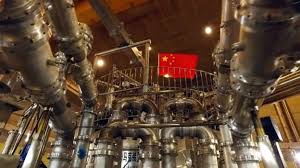Imagine infinite electricity with clearly no waste at all: that is the lofty promise of nuclear fusion.
On technological know-how Island in eastern China's Anhui
Province, there is a large sparkling steel doughnut encased in an full-size
shiny, spherical container approximately as big as a -storey condominium. That is
the Experimental superior Superconducting Tokamak (or EAST).
Inside, hydrogen atoms fuse and turn out to be helium that
can generate heat at several times the temperature of the sun's core.
Effective magnets then control the reaction, which could in
the future produce full-size amounts of power if maintained.
Around the world, they're trying to grasp nuclear fusion -
within the u.s.a., Japan, Korea, Brazil and eu Union - however none can preserve
it consistent for as long as the crew in Anhui.
Right now it really is 100 seconds and it gets longer each
12 months. Here they're already speaking about dreams which are 10 times as
lengthy, at temperatures of one hundred million tiers Celsius.
Image caption
Loads of professionals are working on the site
But there is a cause why fusion has eluded scientists and
engineers because the early advances within the Soviet Union within the
Fifties.
It's far honestly hard.
Secure nuclear electricity
Maintaining a confined fusion reaction in a controlled
surroundings has been feasible for extra than 50 years and yet the period
remains a long way short of what might be needed to seize this sizeable heat
and convert it to energy.
The EAST system is a souped-up version of the authentic
Russian layout.
At the day we go to we watch a energetic debate unfold in
the manipulate room. There are leakage problems - now not fabric getting out
but air being sucked into the vacuum within - and that they need to find a
solution.
A separate group is in walkie-talkie touch with the control
room. They flow across the configuration of pipes, electricity housing and
stepladders surrounding the Tokamak, seeking to patch the leak.
While Xi Jinping visited here he wanted to recognize about
the risks of this era, so we asked what they told China's president.
"A fusion reactor is quite secure compared with fission
reactor," says tune Yuntao, deputy director at EAST.
"Magnetic confinement is controllable fusion. I will
close down the energy supply and it is flawlessly safe. There may not be any
nuclear catastrophe."
Photograph caption
The chinese language undertaking builds on earlier Russian
research
Cutting-edge nuclear reactors rely on fission and the
splitting of an atom which leaves poisonous waste that ought to be safely saved
for probably tens of lots of years.
A nuclear fusion strength plant would rather stem from the
joining of two nuclei to make a single nucleus and then magnets in the internal
wall of the doughnut include the response (referred to as the plasma) within
the massive tube.
Crucially, we are instructed, this leaves nearly no waste.
A hefty price tag
But the era isn't always reasonably-priced.
It fees $15,000 a day simply to show on the device and
that's without the wages of hundreds of professionals, the construction of
buildings and so forth.
And but the chinese language authorities is digging into its
deep wallet to fund the venture within the full knowledge that it could be
decades before fusion is lights up primary cities.
"Fusion goes to require big breakthroughs from
scientists and engineers as well as a number of economic backing from the
government," Mr music says.
"it's a undertaking which expenses so much but
individually I think it'll be extraordinary for the sustainable improvement of
mankind."
Because it carries the sort of hefty rate tag and due to the
fact it is so hard, the pursuit of fusion is seeing a fair amount of worldwide
collaboration.
For instance, China is one of the international locations
contributing to the formidable international Thermonuclear Experimental Reactor
(ITER) challenge in southern France which - aside from european international
locations - draws in India, Japan, Russia, South Korean and the us. It is
predicted to start trying out in 2025.
Inside the period in-between China is also making leaps and
limits on its very own.
Picture caption
The project still calls for big breakthroughs from
scientists and engineers
The proposed subsequent step for this team is to layout a
totally-fledged nuclear fusion take a look at reactor capable of producing
power. To subsequently work properly it'd have to be a good deal larger than
what we've got seen and capable of include a plasma reaction indefinitely
rather than for a minute-and-a-half of.
"The demand for energy is big in every usa and China
has a roadmap for fusion-generated electricity," says Mr track. "We
want to finish the layout for a test fusion reactor within 5 years. If we be
triumphant it will likely be the arena's first fusion reactor."
The eventual hope is that fusion would possibly produce
electricity in volumes beyond mankind's wildest goals.
It is able to be a few way off but Beijing is taking the
challenge very critically that means that, if it could get it to paintings,
China may want to emerge as having the edge over all others in terms of the
strength technology of the future.

No comments:
Post a Comment